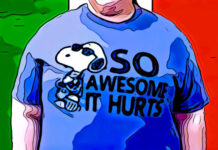The Health and Care Bill, enacted in England on 4/28/22, introduces a stop to junk food advertising (HFSS, High in Fats, Sugar and Sodium), starting in October 2022.
This measure is part of a broader strategy to combat obesity, overweight and related diseases (NCDs) introduced by the British government in July 2020. (1)
Foreword. Junk food and incurable diseases
So-called NCDs(Non-Communicable Diseases) – cardiovascular diseases, diabetes, cancers and other ills associated with unbalanced diets – have an impact on public health spending in the UK of more than £6 million. With an estimated growth to 10 million in 2030.
Junk food, that is, ultra-processed foods with imbalanced nutritional profiles (HFSS), is considered to be the leading cause of noncommunicable diseases and premature mortality. In England, as in the EU and the world. (2)
2) England, the Health and Care Bill.
The Health and Care Bill was presented by the government to Parliament in London on 6.7.20 to improve the health of the British population with more effective measures to prevent Non-Communicable Diseases (NCDs) than those already in place. (3) The traffic light nutrition label (
traffic lights system
) and the
sugar tax
have indeed not been enough to counter junk food consumption.

Civil society-prevention and patient protection associations, consumers, scientific societies (4)-has therefore exerted pneumatic pressure, free from conditioning and conflicts of interest such as those that dominate the battle against NutriScore in Italy. All the way to an outcome that includes potentially suitable measures to protect children from predatory marketing of junk food(Unicef, 2020). (5)
2.1) Restrictions on junk food marketing.
The marketing of ultra-processed HFSS foods (not also minimally processed foods, e.g., oil, butter, salmon) is drastically restricted:
– ban on television advertising, from 5:30 a.m. to 9 p.m., on live and on-demand channels under the jurisdiction of the UK Communications Authority(Ofcom),
– Online marketing ban. Stop paid advertising and ads (i.e., paid in kind, through product delivery), including those on email and messaging services.
2.2) Exceptions
The exceptions to the above restrictions are unfortunately significant, as they concern:
– the media (e.g. websites, blogs, social media) owned by brands, whose owners exercise editorial control and content ownership,
– online advertisements paid for by non-UK-based operators, as long as they are not essentially directed at that market (based on appropriate criteria defined in the Health and Care Bill),
– brand advertising only, provided that the ad does not refer or relate to junk food, (an understatement, in cases such as Pringles, Nutella, M&Ms, etc.)
– small and medium-sized enterprises,
– audio content available online (e.g., podcasts, radio),
– broadcasting,
– B2B online promotion,
– Online transactional content (e.g., ecommerce). (6)
2.3) Restrictions on the sale of junk food.
Physical and digital retail with more than 50 employees is in turn subject to a number of prohibitions as it relates to the sale of HFSS ultra-processed foods:
(a) ‘quantity-price’ promotional offers (e.g. 3×2, same price plus product),
(b) placement of HFSS foods in strategic locations within stores (e.g., entrances, beginning and end of aisles, forecourts),
(c) junk food promotion on home page, pop-ups, shopping cart closing pages and payment,
(d) offer free refills(refills) of sugary drinks. (6)
Freeing the supply chain from the junk food cycle, ESG
Financial Times
, the City of London newspaper, offers a pragmatic reading of the Health and Care Bill. Noting how the first responses are coming precisely from financial investors engaged in the food industry. Who simply acknowledged the need to change strategy.
Investors have thus begun to ask the publicly traded Big Food giants what industry strategies they have planned to get rid of junk food cycle make profits in different ways. (7) All the more so, we add, as the ESG(Environment, Social, Governance) parameters of investments are not compatible with the production of food that is harmful to health. (8)
Interim conclusions
Sickening populations through the supply and neuromarketing of ultra-processed foods with unbalanced nutritional profiles is very POP(Profit Over People) but it is neither sustainable nor acceptable.
The British government has been able to strengthen the levees to guard public health and that of children in particular, and has therefore been held up as a model by the WHO itself. (9) Meanwhile, in Italy, 1 in 4 minors are at risk of serious health damage because of politicians enslaved to Big Food. (10) Shame!
Dario Dongo
Notes
(1) Marta Strinati.
Junk food, stop promotions in UK supermarkets.
. GIFT (Great Italian Food Trade). 30.12.20,
(2) Marta Strinati, Dario Dongo. Global Syndemic, the deadly mix of malnutrition and ecological crisis. GIFT(Great Italian Food Trade). 7.6.19,
(3) Dolly R Z Theis, Martin White (2021). Is obesity policy in England fit for purpose? Analysis of government strategies and policies, 1992-2020. Milbank Quarterly; 19 Jan 2021; doi: 10.1111/1468-0009.12498 https://onlinelibrary.wiley.com/doi/10.1111/1468-0009.12498
(4) Dario Dongo and Andrea Adelmo Della Penna. Ultraprocessed foods, the worst evil. Appeal of scientists in the British Medical Journal. GIFT (Great Italian Food Trade). 16.8.21,
(5) Health and Care Bill granted Royal Assent in milestone for healthcare recovery and reform. UK Government. 28.4.22,
(6) Health and Care Bill: advertising of less healthy food and drink. UK Government. 10.3.22,
(7) Camilla Cavendish. We have been Big Food’s lab rats for too long. Financial Times. 29.4.22, https://www.ft.com/content/56fe8c61-bd2d-4d6e-ae51-171657b472c8
(8) Dario Dongo.
Due diligence and ESG, corporate social and environmental sustainability, the proposed EU directive.
. GIFT (Great Italian Food Trade). 20.4.22
(9) Marta Strinati. WHO chooses UK model to reduce calorie and sugar intakes in the Old Continent. GIFT(Great Italian Food Trade). 2.10.21,
(10) Dario Dongo, Sabrina Bergamini. Childhood obesity, 1 in 4 children at risk in Italy. Istat Report. GIFT (Great Italian Food Trade). 29.10.19,
Dario Dongo, lawyer and journalist, PhD in international food law, founder of WIISE (FARE - GIFT - Food Times) and Égalité.








